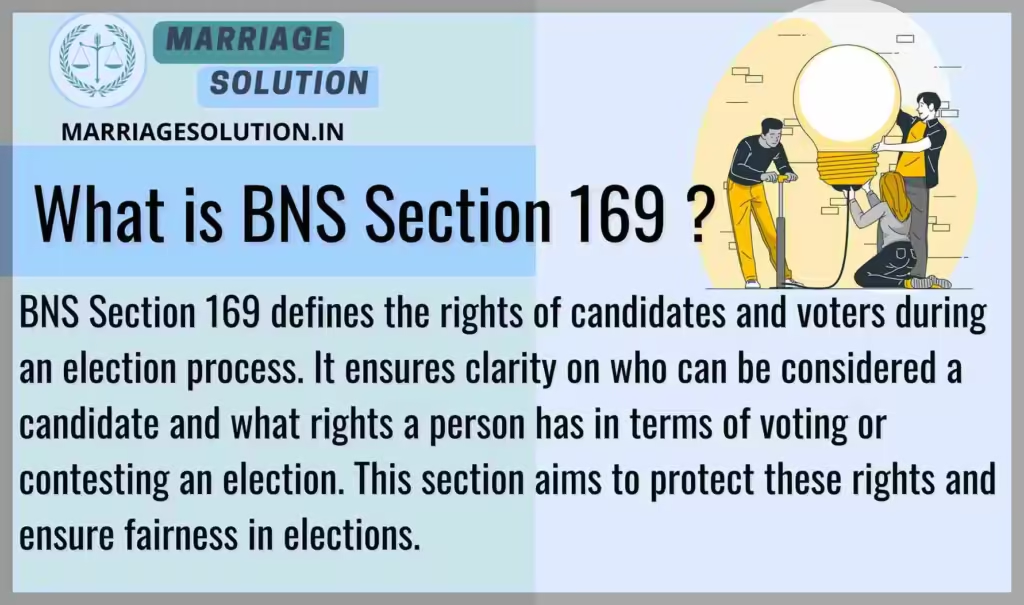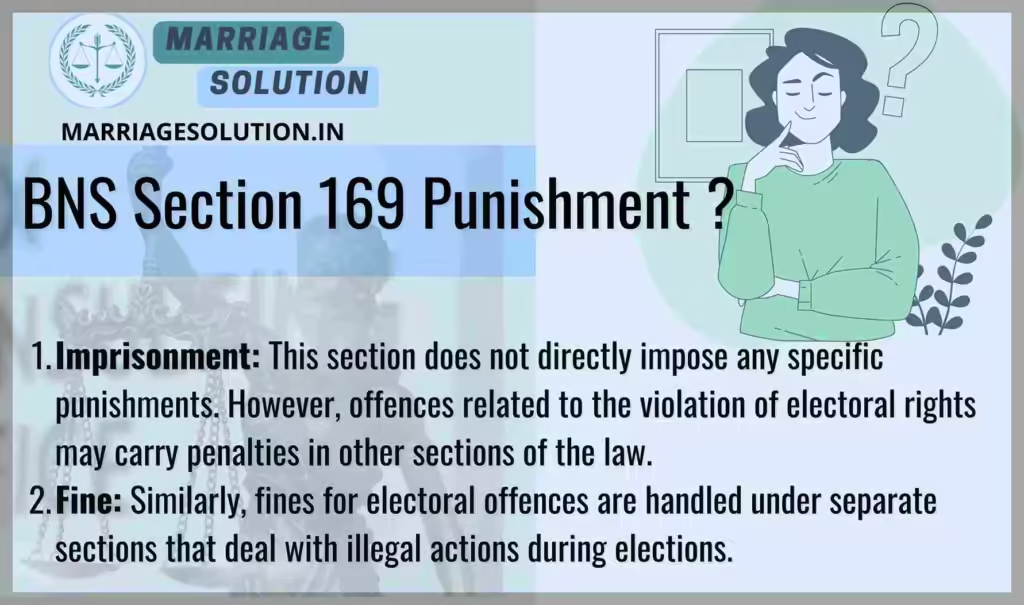Introduction of Section 169 BNS
Section 169 of the Bharatiya Nyaya Sanhita (BNS) provides clear definitions of two key election-related terms: “candidate” and “electoral right.” A candidate is a person officially nominated to contest in an election, while electoral right refers to a person’s right to stand for election, withdraw from candidacy, or vote or abstain from voting.
This section ensures that the foundation of electoral law is well-defined and transparent, preventing misuse of electoral rights and protecting the democratic process.
The Bharatiya Nyaya Sanhita (BNS) Section 169 replaces the old Indian Penal Code (IPC) Section 171-A.
What is BNS Section 169 ?
BNS Section 169 defines the rights of candidates and voters during an election process. It ensures clarity on who can be considered a candidate and what rights a person has in terms of voting or contesting an election. This section aims to protect these rights and ensure fairness in elections.

Section 169 Bharatiya Nyaya Sanhita
“Candidate” means a person who has been nominated as a candidate at any election; and “electoral right” means the right of a person to stand or not to stand as, or to withdraw from being, a candidate, or to vote or refrain from voting at an election.
Section 169 provides the legal meaning of key electoral terms in India. It clarifies who is considered a candidate and what constitutes an electoral right. This section protects the freedom of choice for both candidates and voters in the democratic process.
1. Candidate = Nominated Person
- Any individual officially nominated for an election becomes a candidate, whether or not they finally contest.
2. Electoral Right = Freedom of Choice
- The right to:
- Stand for election.
- Withdraw from candidacy.
- Vote for a candidate.
- Abstain from voting.
3. Protects Voting Freedom
- No one can be forced to vote, withdraw, or contest — the choice is completely personal.
4. Foundation of Election Law
- These definitions act as the base for all other electoral offences (e.g., bribery, undue influence).
5. Ensures Fair Elections
- Protects candidates’ rights and ensures that every voter has the liberty to decide freely.
Examples of BNS Section 169
Example 1 – Withdrawal of Candidacy:
Ravi files his nomination for municipal elections but later decides not to contest. Section 169 protects his right to withdraw without any penalty.
Example 2 – Freedom Not to Vote:
Sneha chooses not to vote in state elections. Section 169 ensures her right to abstain without legal consequences.
Why Section 169 is Important
- Defines Basic Electoral Rights → Without clear definitions, election laws would lack certainty.
- Protects Democracy → Ensures people are free to participate or not, based on their choice.
- Prevents Coercion → No one can force you to contest or cast a vote.
- Acts as a Legal Foundation → Forms the basis for prosecuting electoral offences (like voter intimidation).
- Upholds Fair Elections → Safeguards the rights of both voters and candidates.
Section 169 BNS Overview
BNS Section 169 sets out the following important definitions:
- Candidate: Any person who has been nominated to stand for an election.
- Electoral Right: The right of a person to either stand for election, withdraw from being a candidate, or vote, or refrain from voting.
These definitions form the foundation of electoral laws in the Bharatiya Nyaya Sanhita and ensure clarity in legal matters related to elections.
Detailed Key Points of BNS Section 169
- Definition of “Candidate”
A “candidate” is someone who has been officially nominated to participate in an election. This ensures that only those officially chosen can stand for election. - Definition of “Electoral Right”
“Electoral right” includes the right to stand as a candidate, withdraw from candidacy, and choose whether to vote or abstain. This protects individuals’ freedom in elections. - Clarity in Election Law
This section provides a clear legal definition for terms used in election laws, avoiding confusion and ensuring consistent interpretation in courts. - Protection of Personal Choice
By defining electoral rights, this section ensures that individuals have the freedom to decide whether to run for office or vote, without any legal compulsion. - Foundation for Election-Related Offences
Understanding these definitions is important, as they provide the basis for addressing violations of electoral rights, such as voter intimidation or coercion. - Right to Withdraw Candidacy
A candidate can decide not to contest an election even after being nominated. This withdrawal right is crucial for candidates who may change their mind. - Right to Abstain from Voting
Individuals have the choice to either vote or abstain, reinforcing the principle that voting is a right, not an obligation, in a democratic society. - Application in All Elections
These definitions apply to any election, whether local, state, or national, ensuring consistency across all levels of government. - Legal Protection of Voting Freedom
This section ensures that the right to vote is protected under law, allowing citizens to participate freely in the democratic process. - Legal Basis for Electoral Offences
By clearly defining “candidate” and “electoral right,” the law sets the stage for legal proceedings in cases where these rights are violated.
Examples of BNS Section 169
- Example 1: Withdrawal from Candidacy
Ramesh is nominated to run for a local election as a candidate. After some consideration, he decides he no longer wants to contest. Under Section 169, Ramesh can legally withdraw from the election without any consequences. - Example 2: Right to Abstain from Voting
Priya chooses not to vote in an upcoming election for personal reasons. BNS Section 169 protects her right to refrain from voting without facing any legal repercussions, as voting is not mandatory under electoral law.
BNS 169 Punishment
- Imprisonment: This section does not directly impose any specific punishments. However, offences related to the violation of electoral rights may carry penalties in other sections of the law.
- Fine: Similarly, fines for electoral offences are handled under separate sections that deal with illegal actions during elections.

BNS 169 bailable or not ?
Since Section 169 focuses on defining terms and does not outline specific offences, the concept of bail does not apply directly to this section. However, related offences involving electoral misconduct may be addressed under different sections that specify whether the offence is bailable or not.
Comparison – BNS Section 169 vs IPC Section 171A
| Section | What it Means | Punishment | Bail | Cognizable? | Trial By |
|---|---|---|---|---|---|
| BNS Section 169 | Defines key electoral terms — “candidate” (a nominated person) and “electoral right” (the right to stand, withdraw, vote, or abstain). Ensures democratic freedom and fairness in elections. | No direct punishment under this section (it provides definitions). Related offences covered in later BNS sections. | Not Applicable (definition-based section) | Not Applicable | Not Applicable |
| IPC Section 171A (Old) | Earlier IPC provision defining “candidate” and “electoral right” for the purpose of election-related offences like bribery or undue influence. | No direct punishment; served as a reference section for election offences under IPC. | Not Applicable | Not Applicable | Not Applicable |
BNS Section 169 FAQs
What does “electoral right” mean?
Electoral right refers to a person’s right to stand for election, withdraw from being a candidate, or vote or not vote.
Can a candidate withdraw from the election?
Yes, candidates can withdraw after being nominated, according to BNS Section 169.
Is voting compulsory under BNS Section 169?
No, individuals have the right to choose whether to vote or abstain from voting without any penalty.
Does BNS Section 169 apply to all elections?
Yes, this section applies to any local, state, or national election in India.
What is the main purpose of BNS Section 169?
The main purpose is to clearly define key terms related to elections to protect the rights of candidates and voters.
Conclusion
BNS Section 169 plays an important role in protecting the democratic process by defining what it means to be a candidate and what constitutes an electoral right. By ensuring that individuals can stand, withdraw, vote, or abstain without fear of penalty, this section safeguards free choice and fairness in elections. It modernizes and replaces IPC Section 171A, aligning electoral definitions with India’s updated legal framework.
Need Legal Support?
If you’re facing court proceedings, marriage-related issues, or any legal matter, our team at Marriage Solution – Lawyer Help is ready to guide you. Just complete our easy online enquiry form, and we’ll connect you with the right legal assistance tailored to your needs. helpful. By completing our enquiry form and submitting it online, we can provide customized guidance to navigate through the process
Finished with BNS 169 ? Continue exploring the next provisions of the Bharatiya Nyaya Sanhita (BNS), 2023. Each section includes explanations, examples, and plain-language breakdowns for easy understanding.
- 170 BNS : Bribery.
- https://marriagesolution.in/bns_section/170-bns/
- BNS 171 : Undue influence at elections.
- https://marriagesolution.in/bns_section/bns-171/
- BNS 172 : Personation at elections.
- https://marriagesolution.in/bns_section/bns-172/
- BNS 173 : Punishment for bribery.
- https://marriagesolution.in/bns_section/bns-173/
- BNS 174 :Punishment for undue influence or personation at an election.
- https://marriagesolution.in/bns_section/bns-174/
Full IPC Section List: https://marriagesolution.in/ipc-section-list
All Indian Law & Blogs: https://marriagesolution.in/indian-law/
Full BNSS Section List: https://marriagesolution.in/bnss_section-list
